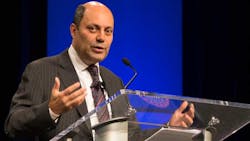Kennametal's Cardoso: Deflating Myths, Rebuilding the Dream
MILWAUKEE — Carlos Cardoso, the president and CEO of Kennametal (IW 500/301), knows a thing or two about the American Dream.
When he came to the United States from Portugal-via-Africa at age 17, he didn't know a word of English. So he studied hard. Then he put his nose to the grindstone and worked even harder. Eventually, he made it all the way to the top of his field.
But as he climbed, he saw the dream start to crumble beneath him. And he observed others behind him in line finding fewer and fewer opportunities to follow in his footsteps.
Now Cardoso wants to help rebuild the American Dream. He wants to start a movement to revive it, and he wants the manufacturing sector to lead the charge.
"Like many of you, a career in manufacturing made it possible for me to live the American Dream," Cardoso said during his keynote address at the recent 2014 Best Plants conference. "That career provided a path to lifelong learning and a great livelihood for me and my family. Now it's in danger of fading, and I wonder if that dream has been taken for granted."
Cardoso said that while manufacturing remains "the economic engine of the American Dream," most Americans have lost touch with that fact because it has been obscured by a number of media-driven myths that distort the public's view of the manufacturing sector. Myths such as:
- The myth of no jobs.
- The myth of the unschooled factory worker.
- The myth of manufacturing work viewed in 4D: dark, dirty, dangerous and dull.
The perpetuation of these myths has made the task of recruiting skilled workers to fill factory jobs far more difficult than it would otherwise be, he said.
Be the Change
Cardoso offered reams of data to debunk each of these media-driven manufacturing myths. But he also recognized that he was talking to a room full of converts, and that a lone voice can't turn the tide.
"We have a perception problem bordering on apathy," he said. "So what do we need to do? To borrow a phrase from Gandhi, it's up to all of us to be the change we want to see."
Cardoso laid out an action plan for manufacturing executives to follow based on three tenets: advocacy, collaboration and educational engagement.
"Changing the entire national mindset is difficult," he said. "It requires a cohesive effort that brings everything we're doing under one strong brand umbrella. It's about creating a movement. We need to make this a national campaign, and take it everywhere: in person, in classrooms, in the media, online, and, most important, in our facilities."
Educational engagement is crucial to turning the tide and boosting the public's image of manufacturing so that it becomes a more appealing career option for the next few generations that will be entering the workforce, Cardoso said.
"Among the most valuable things you can do is to engage educational institutions in your community—especially those you're relying on to supply the skilled workforce you need," he said. "They need your involvement, because only you can help them develop the right curriculum and programs for the skills you need. At the same time, by engaging them directly, you provide real-world perspective to students, teachers and guidance counselors about career opportunities in our industry."
About the Author
Pete Fehrenbach
Pete Fehrenbach, Associate Editor
Focus: Workforce | Chemical & Energy Industries | IW Manufacturing Hall of Fame
Follow Pete on Twitter: @PFehrenbachIW
Associate editor Pete Fehrenbach covers strategies and best practices in manufacturing workforce, delivering information about compensation strategies, education and training, employee engagement and retention, and teamwork. He writes a blog about workforce issue called Team Play.
Pete also provides news and analysis about successful companies in the chemical and energy industries, including oil and gas, renewable and alternative.
In addition, Pete coordinates the IndustryWeek Manufacturing Hall of Fame, IW’s annual tribute to the most influential executives and thought leaders in U.S. manufacturing history.

